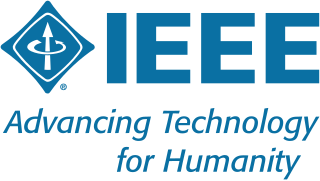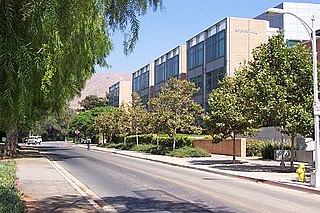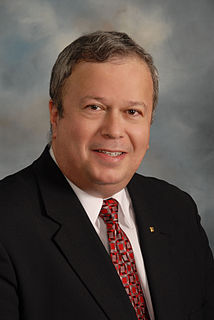Related Research Articles

Computing is any goal-oriented activity requiring, benefiting from, or creating computing machinery. It includes the study and experimentation of algorithmic processes and development of both hardware and software. It has scientific, engineering, mathematical, technological and social aspects. Major computing disciplines include computer engineering, computer science, cybersecurity, data science, information systems, information technology and software engineering.

Computer science involves the study of or the practice of computation, automation, and information. Computer science spans theoretical disciplines to practical disciplines. Computer science is generally considered an area of academic research and distinct from computer programming.
Software engineering is an engineering approach on a software development of systematics application.

Computer engineering is a branch of electrical engineering that integrates several fields of computer science and electronic engineering required to develop computer hardware and software. Computer engineers usually have training in electronic engineering, software design, and hardware-software integration instead of only software engineering or electronic engineering. Computer engineers are involved in many hardware and software aspects of computing, from the design of individual microcontrollers, microprocessors, personal computers, and supercomputers, to circuit design. This field of engineering not only focuses on how computer systems themselves work but also how they integrate into the larger picture.

The Institute of Electrical and Electronics Engineers (IEEE) is a 501(c)(3) professional association for electronic engineering and electrical engineering with its corporate office in New York City and its operations center in Piscataway, New Jersey. It was formed in 1963 from the amalgamation of the American Institute of Electrical Engineers and the Institute of Radio Engineers.

In Europe, biosystems engineering is a field of engineering which integrates engineering science and design with applied biological and environmental sciences. It represents an evolution of engineering disciplines applied to all living organisms not including biomedical applications. Therefore, biosystems engineering is 'the branch of engineering that applies engineering sciences to solve problems involving biological systems'.
The ABET, incorporated as the Accreditation Board for Engineering and Technology, Inc., is a non-governmental organization that accredits post-secondary education programs in applied and natural science, computing, engineering and engineering technology.

The J. B. Speed School of Engineering was founded in 1925 as part of the University of Louisville in the U.S. state of Kentucky with money from the James Breckenridge Speed Foundation which was created by his children William S. Speed and Olive Speed Sackett to honor J. B. Speed. Until 2003, it was known as the J. B. Speed Scientific School.

The Marlan and Rosemary Bourns College of Engineering, or commonly known as Bourns Engineering or BCOE, is an Accreditation Board for Engineering and Technology-accredited College of Engineering located in Riverside, California on the campus of the University of California, Riverside. The Marlan and Rosemary Bourns College of Engineering was established in 1989, and named in honor of Marlan Bourns, a B.S. physics graduate of the University of Michigan and Rosemary Bourns, founders of Bourns, Inc.
Computer ethics is a part of practical philosophy concerned with how computing professionals should make decisions regarding professional and social conduct.
In order to be registered as a patent agent or patent attorney in the United States, one must pass the United States Patent and Trademark Office (USPTO) registration examination, officially called the Examination for Registration to Practice in Patent Cases Before the United States Patent and Trademark Office and known informally as the patent bar.

The Technological Institute of the Philippines is a private, stock, non-sectarian school founded in February 1962 by a group of educators headed by engineer Demetrio Quirino Jr. and his wife Teresita Quirino.

Electrical/Electronics engineering technology (EET) is an engineering technology field that implements and applies the principles of electrical engineering. Like electrical engineering, EET deals with the "design, application, installation, manufacturing, operation or maintenance of electrical/electronic(s) systems." However, EET is a specialized discipline that has more focus on application, theory, and applied design, and implementation, while electrical engineering may focus more of a generalized emphasis on theory and conceptual design. Electrical/Electronic engineering technology is the largest branch of engineering technology and includes a diverse range of sub-disciplines, such as applied design, electronics, embedded systems, control systems, instrumentation, telecommunications, and power systems.

Jim Kurose is a Distinguished University Professor in the College of Information and Computer Sciences at the University of Massachusetts Amherst.
Taylor Lockwood Booth was a mathematician known for his work in automata theory.
The American Engineers' Council for Professional Development or simply the Engineers' Council for Professional Development (ECPD), established in June 1932, was an engineering professional body dedicated to the education, accreditation, regulation and professional development of the engineering professionals and students in the United States. ECPD grew and has changed its name to ABET, Inc. and its focus solely to accreditation.
IEEE Computer Society is a professional society of the Institute of Electrical and Electronics Engineers (IEEE). Its purpose and scope is "to advance the theory, practice, and application of computer and information processing science and technology" and the "professional standing of its members". The CS is the largest of 39 technical societies organized under the IEEE Technical Activities Board.

Moshe Kam is an American engineering educator presently serving as the dean of the Newark College of Engineering at the New Jersey Institute of Technology. Until August 2014 he served as the Robert G. Quinn Professor and department head of electrical and computer engineering at Drexel University. In 2011, he served concurrently as the 49th president and CEO of IEEE. Earlier he was IEEE's vice president for educational activities (2005–2007) and IEEE's representative director to the accreditation body ABET. Kam is known for his studies of decision fusion and distributed detection, which focus on computationally feasible fusion rules for multi-sensor systems.

Ishfaq Ahmad is a computer scientist, IEEE Fellow and Professor of Computer Science and Engineering at the University of Texas at Arlington (UTA). He is the Director of Center For Advanced Computing Systems (CACS) and has previously directed IRIS at UTA. He is widely recognized for his contributions to scheduling techniques in parallel and distributed computing systems, and video coding.
Susan E. Conry is an American computer engineer and engineering educator known for her efforts in higher education accreditation, including leading the merger of the Computing Sciences Accreditation Board into ABET in the late 1990s. Her research concerns multi-agent systems; she is a professor emerita and former Distinguished Service Professor of Electrical and Computer Engineering at Clarkson University.
References
- 1 2 3 "CSAB Home page". CSAB. Retrieved 2010-09-15.
- 1 2 3 4 5 "2010 CAC Institutional Representatives' Day Presentation, p15-16: CSAB Inc" (PDF). ABET. July 2010. Archived from the original (PDF) on 2010-12-24. Retrieved 2010-09-15. Presentation found on ABET Presentations Archived September 17, 2010, at the Wayback Machine .
- ↑ "Association for Information Systems Withdraws from CSAB" (PDF). CSAB. Sep 23, 2009. Archived from the original (PDF) on October 11, 2010. Retrieved 2010-09-15. News Release found on CSAB News Archived 2010-10-30 at the Wayback Machine .
- ↑ "ABET Members". ABET. Archived from the original on 2010-09-17. Retrieved 2010-09-15.
- ↑ "IEEE Computer Society Marks 60th Anniversary". IEEE-CS. August 7, 2007. Archived from the original on 2011-06-29. Retrieved 2010-10-23.
- ↑ "Tribute to Taylor L. Booth". IEEE-CS. Archived from the original on 2010-06-17. Retrieved 2010-10-23.
- ↑ "Integration of CSAB and ABET". Missouri University of Science and Technology. 2000. Archived from the original on 2010-06-16. Retrieved 2010-10-09.
- ↑ "ABET Integration Update". Roy Levow. July 11, 2000. Retrieved 2010-10-09.
- ↑ "CSAB Fellow Will Be First Computing Professional to Serve on ABET Board Executive Committee". CSAB. April 5, 2010. Archived from the original on July 24, 2011. Retrieved 2010-10-08. News Release found on CSAB News Archived 2010-10-30 at the Wayback Machine .